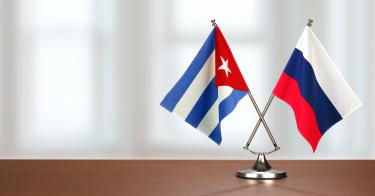As President Trump works to end the war in Ukraine, at least one of our closest neighbors has been working to keep it going: Cuba.
Over the past two years, Havana has been quietly developing itself as an exporter of mercenary manpower to fight U.S. interests. The Ukrainian government estimates that 6,000 to 7,000 Cubans are serving in the Russian military in Ukraine, representing the second greatest force of foreign fighters, just behind North Korea.
This is the latest example of a long-standing history of Cuban support for Moscow as part of Havana’s animosity toward the United States. From the 1950s to as late as 1991, Cuba sent its soldiers abroad, intending to fight U.S. allies and serve as a proxy for Soviet interests thousands of miles from the Caribbean.
Havana traditionally supplied the fighting forces by which the Soviet Union’s ideological and military ambitions could be implemented across the developing world. Tens of thousands of Cuban troops, military advisers and doctors supported communist guerrillas and would-be despots in countries such as Ethiopia, Yemen, Angola and Grenada.
>>> Wokeness Finds New Life South of the Border
Now, more than three decades since the collapse of the USSR, a new generation of Cuban fighters is engaged in a Russian war, not under the banner of Marxist-Leninist fraternity but as contract soldiers.
With the number of Russian troops killed or wounded reaching potentially more than 800,000, Russia is bleeding more manpower than at any other time since the Second World War. To avoid the domestic political risks of further mobilizing Russians, President Vladimir Putin has turned to foreign mercenaries to plug this manpower gap.
Cuba is still more than happy to confirm its support for Moscow and enable such a recruitment drive, albeit with the window dressing of neutrality. This effort allows Cuba to offer a tangible benefit for the billions of dollars it has been lent by Russia, the tens of billions of dollars in debt that Moscow has forgiven, and Russia’s role in propping up the Cuban energy market through the sale of oil and financing the repair of its domestic energy production.
Thus, Cuba has offered its covert military support on international stages. It has denied sending mercenaries to Russia and released statements claiming “mercenaryism” was a crime, but its actions fail to back this up. Reportedly, up to 40% of the Cubans recruited into the Russian military belong to Cuba’s armed forces. Once recruited, these troops go on to be inserted into the Russian military, in exchange for which the Castro regime receives economic bonuses for each soldier sent. Of course, recruitment on such a scale can’t be done without the Cuban government’s support.
The logistics are relatively simple, as Cubans don’t need visas to travel to Russia and can even take direct flights to Moscow from Cuba’s major airports.
>>> Venezuela’s Aggression Toward Guyana Must End
Pay is clearly the primary motivating factor. Leaked documents show that Cubans can increase their salaries by nearly 18,600%, going from an average of $160 annually to almost $30,000. This is particularly attractive to the average Cuban in the wake of severe domestic shortages, inflation and a spiraling humanitarian crisis.
Russia has sweetened the pot even further by offering Cuban volunteers the ability to earn Russian citizenship for themselves and their families, and with it a golden ticket to escape the never-ending repression and economic crisis of their homeland.
Yet far beyond all the Cuban men being drawn by either money or ideology to fight for Russia against Ukraine, Moscow has also duped many more Cuban citizens. It has tricked Cuban men who, unaware of the sheer scope and brutality of the war, merely believed what they were told: that they were being recruited into low-skilled, civilian jobs.
According to Dr. Orlando Gutierrez Boronat of the Assembly of the Cuban Resistance, 6,000 to 7,000 Cubans today are serving on the front lines in some of the most brutal battles of the war, with 10% of Cuban recruits dying in the first year of combat and 30% wounded. Ukrainian intelligence estimates that 20,000 Cubans have joined the Russian army since 2022.
This episode clearly demonstrates that, beyond being simply an economic basket case that can’t care for its people, the Cuban regime remains a threat actor that cooperates closely with adversarial governments and opposes the interests of the United States wherever possible.
This piece originally appeared in The Washington Times




